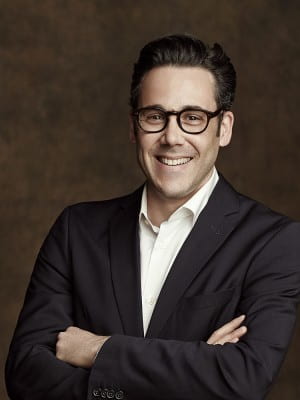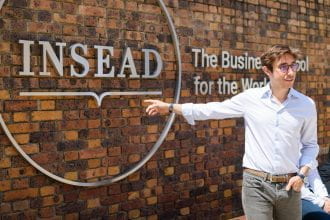
A new centre at INSEAD aims to study the causes and consequences of wealth inequality on a global scale
Of all the issues facing the world today, wealth inequality ranks as one of the most critical, says Jim Stone, an economics scholar and the founder and CEO of the Plymouth Rock Group of Companies. “It has enormous consequences for the future of mankind,” he says.
Identifying those consequences is one of the core goals of The James M. and Cathleen D. Stone Centre for the Study of Wealth Inequality, a new centre established at INSEAD through a $2.5 million gift from Jim and his wife, Cathleen. The centre aims to become the leading venue for the research and teaching of wealth inequality issues, and complements other research funded by the Stones at public policy schools such as the Harvard Kennedy School.
 Establishing the centre in a business school underscores the importance of bringing government and business leaders together to address problems of wealth inequality, says INSEAD Professor Mark Stabile, who will lead the centre and its research agenda as the Stone Chaired Professor in Wealth Inequality.
Establishing the centre in a business school underscores the importance of bringing government and business leaders together to address problems of wealth inequality, says INSEAD Professor Mark Stabile, who will lead the centre and its research agenda as the Stone Chaired Professor in Wealth Inequality.
“Business leaders—and business students who are going to become business leaders—are a part of the solution,” Mark says. “If you want to create policies that are actually going to affect how people accumulate wealth and what they do with that wealth, you are more likely to succeed if you are working with the people who are going to make that wealth. There’s no way that we’re going to be able to tackle these problems effectively without the cooperation and ingenuity of business.”
Approaching inequality from all angles
In keeping with the vision established by Jim and Cathleen, the centre has a two-pronged goal: To contribute to the intellectual debate surrounding wealth inequality, and to inform future business leaders to problems of wealth inequality. “There are social consequences of business activity, and it’s a good thing for business leaders to be introduced to them,” says Jim, who is the author of the bestseller Five Easy Theses: Commonsense Solutions to America’s Greatest Economic Challenges.
To meet those goals, Mark is currently assembling an interdisciplinary team of scholars with expertise in economics, sociology, political sciences and other disciplines to research the causes and effects of wealth inequality in countries around the world.
Specifically, the research team will study how wealth inequality impacts support systems and structures, such as healthcare or education, across a number of different societies. It will also look at the broader set of issues that may result from this inequality, such as decreased worker productivity, slower economic growth or potentially reduced social mobility. The team will gather and draw upon macro-level data to better understand country-specific trends, while also looking at micro-level data to understand what’s happening at the level of the individual. They’ll also look at how some country’s systems, such as France’s tax and transfer system, are impacting the distribution of income. “We want to look at this problem from a number of different angles,” Mark explains.
The insights generated by this research will feed into INSEAD’s new MBA curriculum. For example, Mark will use research outcomes to inform the development of his new course, “Business and Public Policy.” The course plans to focus on the major issues affecting society and emphasise the importance of bringing business and government together to address these issues.
A centre tied to history
In establishing this new centre at INSEAD, Jim and Cathleen continue what has been a long and personal connection to the school.
The relationship started nearly 50 years ago, when Jim, then a twenty-something professional, approached INSEAD Founder Georges Doriot with a business proposition. During that meeting, “Doriot told me, ‘I’m not interested in your business idea,’” Jim recalls. “‘I have a counter-proposal for you: You’re an interesting young man, and I want to pay you $1 a year to have lunch with me once a month.’”
So began the start of an exceptionally close friendship. Georges became “like a second father to me,” says Jim, and helped mentor him on a personal level up until his passing in 1987. Georges was present as Jim navigated a series of career moves, first serving as the Massachusetts Commissioner of Insurance, then serving as Chairman of the U.S. Commodity Futures Trading Commission and finally founding the Plymouth Rock Company.
And in tribute to their late friend’s memory, Jim and Cathleen currently live in the Doriots’ former home in Boston—the very home where Georges conceived the idea for INSEAD. Jim also periodically lectures or teaches entrepreneurship at INSEAD, “because that’s what Doriot would have wanted me to teach,” he says.
It’s not a stretch to say that Georges would have also wanted the Centre for the Study for Wealth Inequality to find its home at INSEAD, and for Jim to lead its founding. In addition to having deep personal ties to the school, Jim brings multifaceted expertise and a unique perspective to the high-stakes issue of wealth inequality.
“I’ve thought about the inequality issue from all three perspectives—from an academic perspective, a regulatory perspective and a private industry perspective,” says Jim. “I think I have, therefore, some enhanced understanding of how important this issue is. I can’t solve it, but I can be a catalyst in causing serious thinkers to look for answers.”
INSEAD is poised to find those answers—not only because of its research talent, but because it is a global institution that is uniquely equipped to tackle world-scale problems.
“INSEAD has a different proposition: We are a global business school,” says Mark. “We have campuses and alumni all over the world. We get a lot more global students and visitors. This is a way to focus some of the work on the rest of the world and help solve this issue.”



Very interesting, this is a growing issue with so many point of views (between the basic “inequality is bad per se at its current levels” vs. “there will always be a trickle-down effect so everything’s fine”) and Trump/Brexit have stressed the side-effects of the ‘elephant curve’ (i.e. over the last decades everybody got richer on a worldwide basis except the developed-countries middle class).
So great to see that the heritage of the founders (here via monthly lunches !) keeps giving.
I would be interested in reading ’emerging views’ and different existing perspectives on the topic as the work progresses. This is a pressing topic today, so would not want to wait for a couple of years to get an INSEAD POV on this.